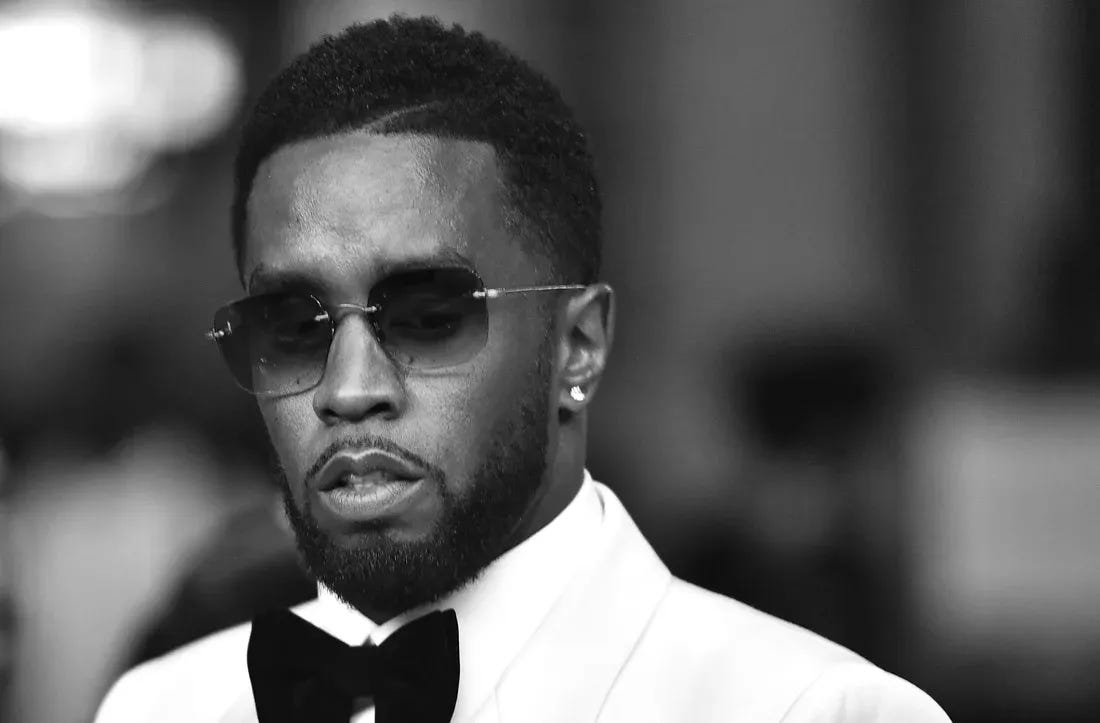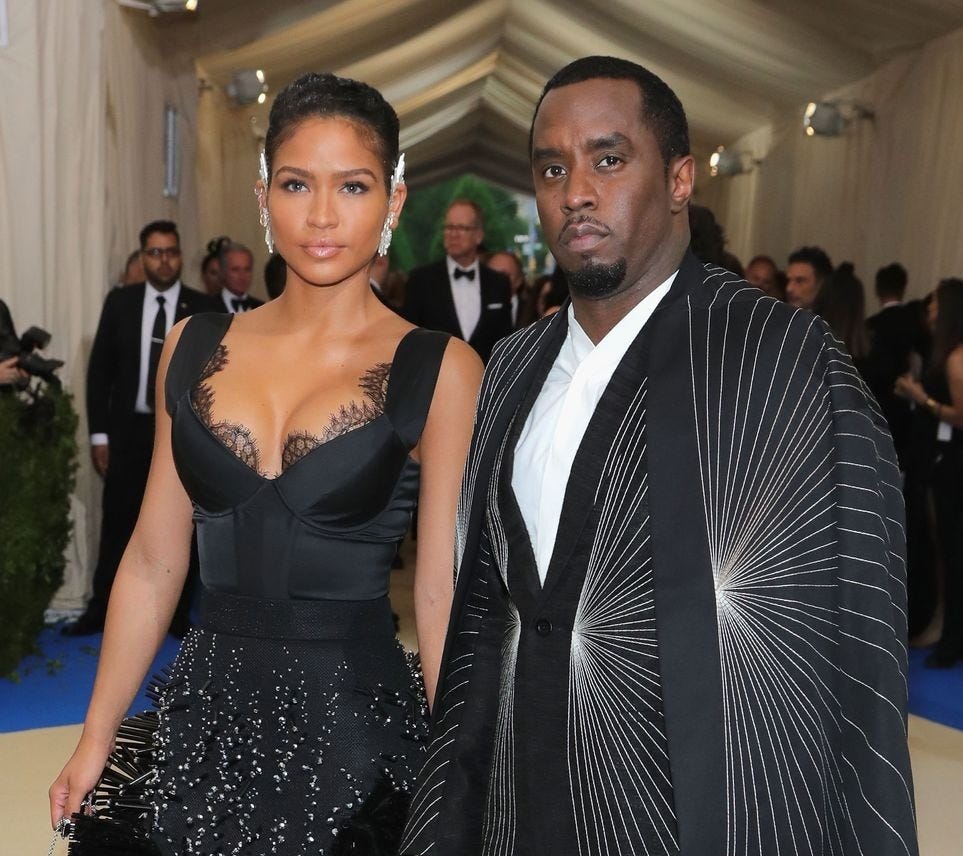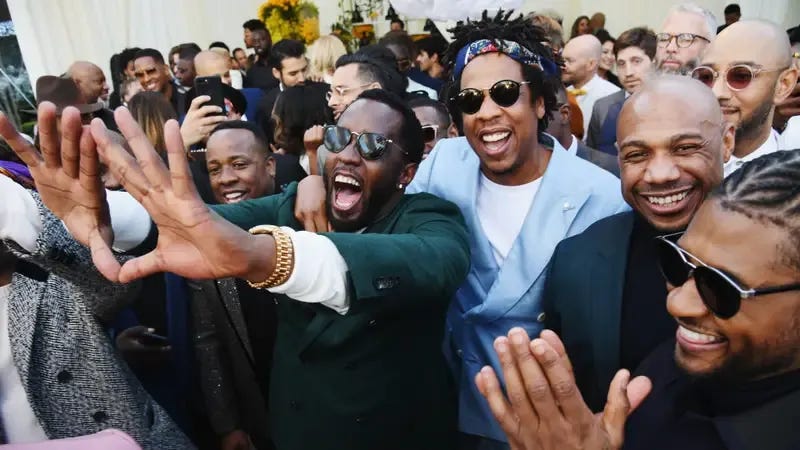Stop Asking Women If Diddy’s Arrest Is Hip-Hop’s #MeToo Moment. Ask The Men.
If a real reckoning in hip-hop is gonna happen, a lot more men in power need to take action and accountability. Loudly.

As an economy built off blurring the lines of work and play, the hip-hop industry works like a hall of funhouse mirrors. Twisting, distorting, mesmerizing and deluding. At this pivotal moment, clearly some of y’all are focused about the wrong reflections.
It's been about three weeks since Sean ‘Diddy’ Combs was arrested on federal charges of sex trafficking, racketeering conspiracy and interstate transportation of prostitution in New York. On Sept. 16, 2024, the linchpin in the argument of the U.S. Attorney’s indictment against Combs was that he had been running his record label, Bad Boy Entertainment, and his other companies, as criminal enterprises all these years, instructing his employees to organize “freak offs” — allegedly drug-fueled, hours- or days-long sex parties — all for Combs’ sexual gratification. The Bad Boy billionaire’s criminal arrest piled on to more than 10 civil lawsuits and counting filed against him within the last year. Starting with Cassie Ventura’s bombshell filing last November, the civil suits accuse the mogul of similar acts of sexual violence, trafficking and coercion. The narrative in these suits allege his abuse was widely known, systematically facilitated by many, concealed, supported and ignored for decades.
Since his arrest, corners of the Internet have been working overtime on this story at a speed that, in comparison, is impossible to ignore. Aside from breaking news on the rolling list of lawsuits and assertions of innocence from Combs’ defense team, there have been running jokes about how many bottles of baby oil were seized from his mansions. There have been old Getty Images shots of the exec’s famous Hamptons white parties posted to implicate other celebs who must’ve known about his deviance. There have been TikTok fancams and conspiracy theories accusing Diddy of being responsible for the death of Tupac, Aaliyah and his ex-girlfriend, Kim Porter. A purported memoir by Porter was published in early September and publicly denounced as fake by her children, but not before it shot to the top of Amazon’s best-seller list. The disinformation has been so unserious, but more importantly, so distracting, that it's caused some lazy cognitive dissonance to creep in on the come up…again.

Remember the summer of 2020 when white people were asking Black people, “What do we do? How can we end racism?” In the aftermath of George Floyd’s murder, in the midst of what’s now coined the racial reckoning, it seemed like well-meaning ytppl had a collective epiphany about racial inequality, but lacked the self-awareness to see how they benefited from it. The knee-jerk result was the privileged asking the oppressed to effectively fix a problem the oppressed didn’t create.
In the weeks since this indictment, there've been similarly societal-shifting questions lodged into the ether. Inquiries around if this will be hip-hop’s watershed moment to address sexual misconduct; If Diddy is the music industry’s Harvey Weinstein and if this is hip-hop’s “#MeToo moment.” (I personally have been asked this in broadcast, podcast, and irl spaces repeatedly in the past three weeks.) It’s a lofty cultural question that’s definitely worth voicing. But what I’ve noticed so far is that it's overwhelmingly women — the historically targeted and oppressed party in all this — who are being asked to answer it.
At this moment in the culture, by directing this question at only the harmed, we’re already failing.
The fact that names like R. Kelly, Russell Simmons and L.A. Reid roll off the tongue as superstars and label heads accused of sexual misconduct shows this is and has been a pervasive, normalized problem. Like the accusations against Diddy, R. Kelly’s criminal charges not only implicated the R&B star but also the entire network of people who enabled his predation for years. And in those cases, it required the victims to go to the ends of their wits, to repeat their stories over and over at the cost of their own reputations, to shed light on the violence. By taking a survey of those who’ve spoken on the indictment so far, very few men in hip-hop, especially ones who love to yap about anything else, have nominated themselves as mouthpieces.
We need to be listening to women always. But in this moment in hip-hop’s history, the weight shouldn’t be solely on the women (i.e. the oppressed) who’ve suffered abuse and been advocating for a reckoning to predict if the industry will finally have one. It should be on the many men (i.e. the privileged) who’ve benefited from the industry’s misogynistic stasis to shake shit up and push for change, even if it means getting knocked off the safety of their perch.
For many, Puff represents the capitalist and cultural heights hip-hop can reach. He’s a rap game success story that spans generations. He’s the epitome of Black excellence. Up until a year ago, toasting with Diddy during Grammys weekend would’ve been considered a bucket list item for any rapper coming up. In a world based on status, proximity brokers power – no matter how opaque – and to be in Diddy’s proximity meant you’d made the upper echelon. It's this level of idolization (matched with an already outsized ego) that could lead someone to think of themselves as invincible, to believe whatever they want they can get. But now that Puff’s power has been called out as malicious, not many of those who’ve shared cigars and champagne with him over the years, who got shine off a cosign or been inspired by his mogul talk have had much to say at all.

And the men in the industry who are saying something really ain’t saying nothing. Always the antagonist, Combs’ longtime rival, 50 Cent (who was also recently accused of sexual assault by his ex) has trolled Combs and other rappers about the unfolding accusations on his Instagram and is reportedly in production on a Netflix docuseries about the charges. Another adversary of Combs, Suge Knight, was interviewed from prison while serving time for manslaughter and said this type of abuse is a cycle that’s been happening in the industry for a long time and that Diddy’s alleged misconduct stems from being abused by an elder himself.
When Ray J, one of the few male artists in Combs’ orbit so far who has spoken publicly post-indictment, was interviewed on News Nation, he made a vague call for “unity” within the industry during this time and claimed all the allegations have come as “hurtful” and “confusing” shock to him. “Right now, we just need to use it as a moment to reflect, not to criticize, but find a better way to move forward,” he said.
The sanitized PR read from the “Sexy Can I” singer landed like the weakest, wackest lead balloon. For a culture promoted as a place to keep it real, this might be one of hip-hop’s fakest displays yet. Can somebody bffr right now?
There could be a few reasons for radio silence in the industry right now. To speak on Diddy at this moment could potentially mean implicating yourself with him in a crime. (I mean, he is facing a racketeering charge and no other co-defendants have been named yet.) And it’s possible some might genuinely have been so shocked by the accusations, they’re at a loss for words. *Le sigh, we cringe on* But even with those reasons, coerced and cooperative silence has been the fuel to keep Diddy’s alleged operation running all this time. To really want to stop it in its tracks and change the direction of the industry, it will require a lot more people to get loud.
Like the downfall of Weinstein that spearheaded the larger #MeToo movement, it’s going to take prolonged investigation — shout out to Cheyenne Roundtree and Nancy Dillon of Rolling Stone on their six-month report — and powerful stakeholders actually, you know, giving up their power.
On Season 2 of Louder Than A Riot, a podcast I co-hosted, my team and I investigated how and why a system of endangering women for the sake of “the culture” came to be the norm in hip-hop and who's still holding it in place now. Activist Tarana Burke, who coined the term “me too” years before it was a hashtag, told us that hip-hop had been able to skate by any reckoning because Black women didn’t feel reflected in the 2017 movement. She also said that as one of the few spaces of society that allowed Black men a voice, it’d be seen as a betrayal to the Black community for victims to call out their men’s abuse.
“If we really loved hip-hop, like accountability is a part of love," Burke said in the interview. "If we really loved hip-hop, then we would hold ourselves accountable. We would hold it accountable. Those two things can happen at the same time. We don't have to tear hip-hop down and hold it accountable. That's how you actually build it up."
This is not 2017 and these are not white actresses of Hollywood accusing Combs. In society that statistically disregards victims of color, in a media landscape where it’s more satisfying to repost than verify and in a music landscape where a callout of pedophilia weaponized as a punchline is crowned hip-hop’s song of the summer, is a reckoning even possible without a total reset? Does hip-hop even deserve that? Put that work and the spotlight on the men who’ve been conveniently quiet these past few months to answer. Otherwise, those funhouse images will warp everything into just being business as usual again and this moment will all be gone like a Puff of smoke and mirrors.
I’m just trying to look at something without blinking, to see what it is like, or it could have been like and how that had something to do with the way we live now. - Toni Morrison





